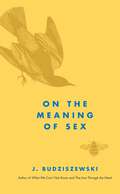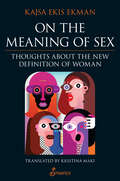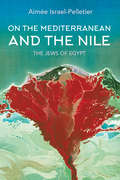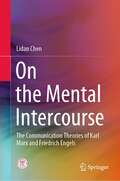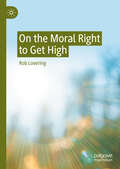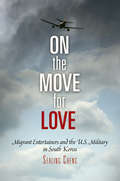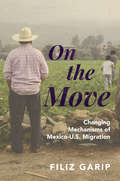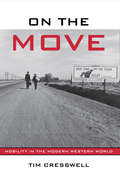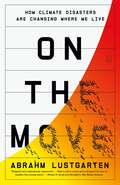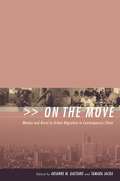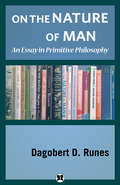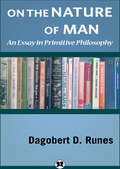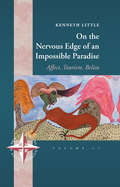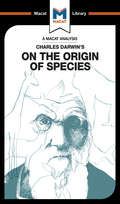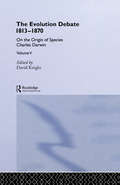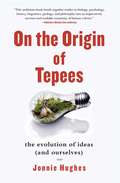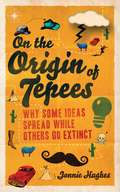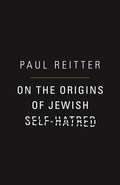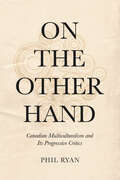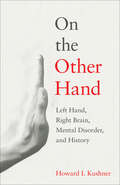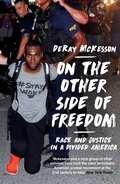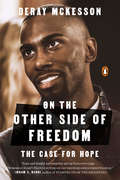- Table View
- List View
On the Meaning of Sex
by J. BudziszewskiOur society is obsessed with sex - and yet we don't understand it at all. Acclaimed philosopher J. Budziszewski remedies the problem in this wise, gracefully written book about the nature, meaning, and mysteries of sexuality. On the Meaning of Sex corrects the most prevalent errors about sex - particularly those of the sexual revolution, which by mistaking pleasure for a good in itself has caused untold pain and suffering.
On the Meaning of Sex: Thoughts about the New Definition of Woman
by Kajsa Ekis EkmanA new definition of woman has taken hold in Western societies. Instead of a matter of biology and material reality, we are told it is an identity. Anyone who declares herself to be a woman is a woman; the body has henceforth become irrelevant. Gender, we are told, is a spectrum, and it resides in the mind. In countries such as Norway, Canada, Argentina and Australia, laws have been enacted that give anyone the right to change his or her legal sex, irrespective of whether the person has had a medical procedure. At the same time, the industry for gender reassignment surgery is growing at an unprecedented pace. Seven out of 10 teenagers who seek treatment are now girls.The new definition of sex has been hailed as progressive. But is it really? And is it new?In this groundbreaking book, Swedish feminist and Marxist author Kajsa Ekis Ekman traces the ideological roots of this new definition.
On the Mediterranean and the Nile: The Jews of Egypt (Indiana Series in Sephardi and Mizrahi Studies)
by Aimée Israel-PelletierAimée Israel-Pelletier examines the lives of Middle Eastern Jews living in Islamic societies in this political and cultural history of the Jews of Egypt. By looking at the work of five Egyptian Jewish writers, Israel-Pelletier confronts issues of identity, exile, language, immigration, Arab nationalism, European colonialism, and discourse on the Holocaust. She illustrates that the Jews of Egypt were a fluid community connected by deep roots to the Mediterranean and the Nile. They had an unshakable sense of being Egyptian until the country turned toward the Arab East. With Israel-Pelletier's deft handling, Jewish Egyptian writing offers an insider's view in the unique character of Egyptian Jewry and the Jewish presence across the Mediterranean region and North Africa.
On the Mental Intercourse: The Communication Theories of Karl Marx and Friedrich Engels
by Lidan ChenThis book meticulously examines the works of Karl Marx and Friedrich Engels (including numerous letters) to present their thoughts on communication and media studies from the perspective of “world intercourse” to reveal their spread in all areas of social information dissemination of ideas. The scope of the book ranges from language, writing and printing to newspapers, and from religion, literature and art, public opinion, and publicity to news, the communication revolution, communication policy, communication psychology, and the free exchanges of workers in the party. It is intended for readers with a college degree or above, especially those concerned about the dissemination of information and social interaction as well as intercourse.
On the Moral Right to Get High
by Rob LoveringIs getting high immoral? In this book, Rob Lovering defends the claim that it is not. More specifically, he argues that recreational drug use (of which getting high is a token) is neither intrinsically, nor generally extrinsically, immoral. In other words, he contends that recreational drug use is neither immoral in and of itself nor generally immoral due to an immoral-making factor with which it may be contingently linked [e.g., harm]. Lovering does so by offering two arguments for recreational drug use&’s ultima facie (all things considered) moral permissibility and critiquing twenty-four arguments for its immorality.Meant to be a companion to Lovering's A Moral Defense of Recreational Drug Use (Palgrave Macmillan, 2015), which was written for a general audience, this book is written for an academic—specifically, philosophical—audience and explores recreational drug use in a deeper, more philosophically and empirically rigorous way.
On the Move for Love
by Sealing ChengSince the Korean War, gijichon--U.S. military camp towns--have been fixtures in South Korea. The most popular entertainment venues in gijichon are clubs, attracting military clientele with duty-free alcohol, music, shows, and women entertainers. In the 1990s, South Korea's rapid economic advancement, combined with the stigma and low pay attached to this work, led to a shortage of Korean women willing to serve American soldiers. Club owners brought in cheap labor, predominantly from the Philippines and ex-Soviet states, to fill the vacancies left by Korean women. The increasing presence of foreign workers has precipitated new conversations about modernity, nationalism, ethnicity, and human rights in South Korea. International NGOs, feminists, and media reports have identified women migrant entertainers as "victims of sex trafficking," insisting that their plight is one of forced prostitution.Are women who travel to work in such clubs victims of trafficking, sex slaves, or simply migrant women? How do these women understand their own experiences? Is antitrafficking activism helpful in protecting them? In On the Move for Love, Sealing Cheng attempts to answer these questions by following the lives of migrant Filipina entertainers working in various gijichon clubs. Focusing on their aspirations for love and a better future, Cheng's ethnography illuminates the complex relationships these women form with their employers, customer-boyfriends, and families. She offers an insightful critique of antitrafficking discourses, pointing to the inadequacy of recognizing women only as victims and ignoring their agency and aspirations. Cheng analyzes the women's experience in South Korea in relation to their subsequent journeys to other countries, providing a diachronic look at the way migrant issues of work, sex, and love fit within the larger context of transnationalism, identity, and global hierarchies of inequality.
On the Move: Changing Mechanisms of Mexico-U.S. Migration
by Filiz GaripWhy do Mexicans migrate to the United States? Is there a typical Mexican migrant? Beginning in the 1970s, survey data indicated that the average migrant was a young, unmarried man who was poor, undereducated, and in search of better employment opportunities. This is the general view that most Americans still hold of immigrants from Mexico. On the Move argues that not only does this view of Mexican migrants reinforce the stereotype of their undesirability, but it also fails to capture the true diversity of migrants from Mexico and their evolving migration patterns over time.Using survey data from over 145,000 Mexicans and in-depth interviews with nearly 140 Mexicans, Filiz Garip reveals a more accurate picture of Mexico-U.S migration. In the last fifty years there have been four primary waves: a male-dominated migration from rural areas in the 1960s and '70s, a second migration of young men from socioeconomically more well-off families during the 1980s, a migration of women joining spouses already in the United States in the late 1980s and '90s, and a generation of more educated, urban migrants in the late 1990s and early 2000s. For each of these four stages, Garip examines the changing variety of reasons for why people migrate and migrants' perceptions of their opportunities in Mexico and the United States. Looking at Mexico-U.S. migration during the last half century, On the Move uncovers the vast mechanisms underlying the flow of people moving between nations.
On the Move: Mobility in the Modern Western World
by Timothy CresswellOn the Move presents a rich history of one of the key concepts of modern life: mobility. Increasing mobility has been a constant throughout the modern era, evident in mass car ownership, plane travel, and the rise of the Internet. Typically, people have equated increasing mobility with increasing freedom. However, as Cresswell shows, while mobility has certainly increased in modern times, attempts to control and restrict mobility are just as characteristic of modernity. Through a series of fascinating historical episodes Cresswell shows how mobility and its regulation have been central to the experience of modernity.
On the Move: The Overheating Earth and the Uprooting of America
by Abrahm LustgartenA New York Times Book Review Editors’ ChoiceA Finalist for the Helen Bernstein Book Award“On the Move explains how we got here and where we’re headed. It’s crucial guide to the world we are creating.” —Elizabeth Kolbert, author of Under a White Sky and The Sixth ExtinctionA vivid, journalistic account of how climate change will make American life as we know it unfeasible.Humanity is on the precipice of a great climate migration, and Americans will not be spared. Tens of millions of people are likely to be driven from the places they call home. Poorer communities will be left behind, while growth will surge in the cities and regions most attractive to climate refugees. America will be changed utterly.Abrahm Lustgarten’s On the Move is the definitive account of what this massive population shift might look like. As he shows, the United States will be rendered unrecognizable by four unstoppable forces: wildfires in the West; frequent flooding in coastal regions; extreme heat and humidity in the South; and droughts that will make farming all but impossible across much of the nation.Reporting from the front lines of climate migration, Lustgarten explains how a pattern of shortsighted policies encouraged millions to settle in vulnerable parts of the country, and introduces us to homeowners in California, insurance customers in Florida, and ranchers in Colorado who are being forced to make the agonizing choice of when, not whether, to leave. Employing the most current climate data and predictive models, he shows how America’s population will be squeezed northward into a shrinking triangle of land stretching from Tennessee to Maine to the Great Lakes. The places many of us now call home are at risk, and On the Move reveals how we’ll deal with the consequences.
On the Move: Women and Rural-to-Urban Migration in Contemporary China
by Tamara Jacka Arianne M. GaetanoThis book explores the impact of migration on the identities, values, worldviews, and social positions of migrant women in contemporary China based on original fieldwork as well as in-depth research in multiple regions of China.
On the Nature of Man
by Dagobert D. RunesThis insightful work, from the pen of the well-known philosopher, is offered as an attempt to define the borderlines of human thinking and human morality. Dr. Runes, in his search for verities and true humanity, takes the reader on an arduous voyage through the depths of the mind. This type of soul-searching philosophy, unburdened by traditional manner and terminology, is sometimes baffling, frequently of melancholy character, but almost always fascinating and inspiring.
On the Nature of Man: An Essay in Primitive Philosophy
by Dagobert D. RunesThis work of philosophical soul-searching explores the mysteries of human life and consciousness.In this fascinating work of spiritual philosophy, Dagobert D. Runes sets out on a contemplative journey unencumbered by the traditional manner and terminology of philosophical writing. His purpose here is to articulate the true essence of humanity and human thought. By turns inspiring and melancholy, Runes peels back the layers of quotidian life to explore its deepest meaning. As Runes puts it in this volume: &“What goes on in the core of our mind, this tumult created of our vexation with the business of animal living, lies just in our mind. Our mind is our whole world; the whole world is in our mind.&”
On the Nervous Edge of an Impossible Paradise: Affect, Tourism, Belize (New Directions in Anthropology #45)
by Kenneth LittleThere are beastly forces in Belize. Forces that are actively involved in making paradise impossible. On the Nervous Edge of an Impossible Paradise is a collection of seven stories about local lives in the fictional village of Wallaceville. They turn rogue in the face of runaway forces that take the form and figure of a Belize beast-time, which can appear as a comic mishap, social ruin, tragic excess, or wild guesses. Inciting the affective politics of life in the region, this fable of emergence evokes the unnerving uncertainties of life in the tourist state of Belize.
On the Nervous Edge of an Impossible Paradise: Affect, Tourism, Belize (New Directions in Anthropology #45)
by Kenneth LittleThere are beastly forces in Belize. Forces that are actively involved in making paradise impossible. On the Nervous Edge of an Impossible Paradise is a collection of seven stories about local lives in the fictional village of Wallaceville. Lives turn rogue in the face of runaway forces that take the form and figure of a Belize beast-time, which can appear as a comic mishap, social ruin, tragic excess, or wild guesses. Inciting the affective politics of life in the region, this fable of emergence evokes the unnerving uncertainties of life in the tourist state of Belize.
On the Normalization of Organized Brutalities: An Organizational Sociological Analysis of the Euthanasia Institution Hadamar
by Dennis FirkusThis book takes an organizational sociological perspective on the systematically carried out mass murders in the context of Nazi euthanasia in Hadamar. On the basis of numerous theoretically elaborated as well as empirically proven organizational mechanisms, it is shown how these illegal practices were "normalized" in an extraordinary way by and for the personnel, who were not trained or otherwise predisposed to murder. The acts thus became a legitimate expectation of action, while at the same time the organizational integration had a desolidarizing, demoralizing, and responsibility-relieving effect.This book is a translation of an original German edition. The translation was done with the help of artificial intelligence (machine translation by the service DeepL.com). A subsequent human revision was done primarily in terms of content, so that the book will read stylistically differently from a conventional translation.
On the Origin of Species
by Kathleen Bryson Nadezda Josephine MsindaiCharles Darwin called on a broad and unusually powerful combination of critical thinking skills to create his wide-ranging explanation for biological change, On the Origin of Species. It’s one of those rare books that takes a huge problem – the enormous diversity of different species – and seeks to use a vast range of evidence to solve it. But it was perhaps Darwin’s towering creative prowess that made the most telling contribution to this masterpiece, for it was this that enabled him to make the necessary fresh connections between so much disparate evidence from such a diversity of fields. All of Darwin’s critical thinking skills were required, however, in the course of the decades of work that went into this volume. Taken as a whole, Darwin’s solution to the problem that he set himself is carefully researched, considers multiple explanations, and justifies its conclusions with well-organised reasoning. At the time of the publication, in 1859, there were various explanations for the changes that Darwin – and others – observed; what separated Darwin from so many of his contemporaries is that he deployed critical thinking to arrive at a significantly new way of fitting explanation to evidence; one that remains elegant, complete and predictive to this day.
On the Origin of Species, 1859 (The\evolution Debate, 1813-1870 Ser.)
by Charles DarwinOn the Origin of Species caused an uproar when it was first published in 1859. Darwin's theory was that species had evolved from simpler organisms by natural selection acting upon the variability of populations. This view was directly opposed to the doctrine of special creation by God and angered the Church and Victorian public opinion. This volume is a facsimile of one of the original copies sent to the eminent geologist Leonard Horner. The volume also includes sample pages from Darwin's original handwritten manuscript; the exclusive property of the Natural History Museum.
On the Origin of Tepees
by Jonnie HughesWhy do some ideas spread, while others die off? Does human culture have its very own "survival of the fittest"? And if so, does that explain why our species is so different from the rest of life on Earth? Throughout history, we humans have prided ourselves on our capacity to have ideas, but perhaps this pride is misplaced. Perhaps ideas have us. After all, ideas do appear to have a life of their own. And it is they, not us, that benefit most when they are spread. Many biologists have already come to the opinion that our genes are selfish entities, tricking us into helping them to reproduce. Is it the same with our ideas? Jonnie Hughes, a science writer and documentary filmmaker, investigates the evolution of ideas in order to find out. Adopting the role of a cultural Charles Darwin, Hughes heads off, with his brother in tow, across the Midwest to observe firsthand the natural history of ideas--the patterns of their variation, inheritance, and selection in the cultural landscape. In place of Darwin's oceanic islands, Hughes visits the "mind islands" of Native American tribes. Instead of finches, Hughes searches for signs of natural selection among the tepees. With a knack for finding the humor in the quirks of the American cultural landscape, Hughes takes us on a tour from the Mall of America in Minneapolis to what he calls the "maul" of America--Custer's last stand--stopping at road-sides and discoursing on sandwiches, the shape of cowboy hats, the evolution of barn roofs, the 28.99 wording of jokes, the wearing of moustaches, and, of course, the telling features from tepees of different tribes. Original, witty, and engaging, On the Origin of Tepees offers a fresh way of understanding both our ideas and ourselves.
On the Origin of Tepees: The Evolution of Ideas (and Ourselves)
by Jonnie HughesWhy do some ideas spread, while others die off? Does human culture have its very own "survival of the fittest"? And if so, does that explain why our species is so different from the rest of life on Earth? Throughout history, we humans have prided ourselves on our capacity to have ideas, but perhaps this pride is misplaced. Perhaps ideas have us. After all, ideas do appear to have a life of their own. And it is they, not us, that benefit most when they are spread. Many biologists have already come to the opinion that our genes are selfish entities, tricking us into helping them to reproduce. Is it the same with our ideas? Jonnie Hughes, a science writer and documentary filmmaker, investigates the evolution of ideas in order to find out. Adopting the role of a cultural Charles Darwin, Hughes heads off, with his brother in tow, across the Midwest to observe firsthand the natural history of ideas--the patterns of their variation, inheritance, and selection in the cultural landscape. In place of Darwin's oceanic islands, Hughes visits the "mind islands" of Native American tribes. Instead of finches, Hughes searches for signs of natural selection among the tepees. With a knack for finding the humor in the quirks of the American cultural landscape, Hughes takes us on a tour from the Mall of America in Minneapolis to what he calls the "maul" of America--Custer's last stand--stopping at road-sides and discoursing on sandwiches, the shape of cowboy hats, the evolution of barn roofs, the 28.99 wording of jokes, the wearing of moustaches, and, of course, the telling features from tepees of different tribes. Original, witty, and engaging, On the Origin of Tepees offers a fresh way of understanding both our ideas and ourselves.
On the Origin of Tepees: Why Some Ideas Spread While Others Go Extinct
by Jonnie HughesAn acclaimed BBC filmmaker uses his anthropological wiles to uncover the evolution of our ideas Adopting the part of a cultural Darwin, Jonnie Hughes headed off on a road trip across exotic America to observe the natural history of human culture in all its weirdness. As he dissects what makes some ideas flourish and others die off, investigates the fashion for low-riding jeans, the wording of memorable joke punch-lines, and the invenor of the iconic cowboy hat. "This book is a delight. Hughes's hilarious travels through the American West do for culture what Darwin did for biology." Susan Blackmore, author of The Meme Machine
On the Origins of Jewish Self-Hatred
by Paul ReitterA new intellectual history that looks at "Jewish self-hatred"Today, the term "Jewish self-hatred" often denotes a treasonous brand of Jewish self-loathing, and is frequently used as a smear, such as when it is applied to politically moderate Jews who are critical of Israel. In On the Origins of Jewish Self-Hatred, Paul Reitter demonstrates that the concept of Jewish self-hatred once had decidedly positive connotations. He traces the genesis of the term to Anton Kuh, a Viennese-Jewish journalist who coined it in the aftermath of World War I, and shows how the German-Jewish philosopher Theodor Lessing came, in 1930, to write a book that popularized "Jewish self-hatred." Reitter contends that, as Kuh and Lessing used it, the concept of Jewish self-hatred described a complex and possibly redemptive way of being Jewish. Paradoxically, Jews could show the world how to get past the blight of self-hatred only by embracing their own, singularly advanced self-critical tendencies—their "Jewish self-hatred."Provocative and elegantly argued, On the Origins of Jewish Self-Hatred challenges widely held notions about the history and meaning of this idea, and explains why its history is so badly misrepresented today.
On the Other Hand: Canadian Multiculturalism and Its Progressive Critics
by Phil RyanFor many, Canadian multiculturalism represents the hope that we can build a society in which people who have come from all corners of the world can fully participate without first subverting or erasing their unique identities. Many progressive critics, however, dismiss this hope as an illusion that serves to mask ongoing racism and inequality. Foregrounding the capitalist nature of the Canadian state and society, On the Other Hand examines the arguments of a range of progressive critics of Canadian multiculturalism. An exercise in “critical listening,” the book aims to both communicate and assess these progressive critiques. It proposes conditions for the intelligibility of social science analysis in general and reflects on the requirements for effective progressive thought and writing. Grounded in a political economy approach, the book argues that capitalism and the capitalist nature of the state must be integrated into our analysis of multiculturalism, immigration policy, and persistent racism. On the Other Hand reveals how progressive critiques can identify real limits of multiculturalism: limits of which we must be aware if we are either to endorse them or seek to transcend them.
On the Other Hand: Left Hand, Right Brain, Mental Disorder, and History
by Howard I. KushnerDoes being left-handed make a person different in any way that matters?Since the late Stone Age, approximately 10 percent of humans have been left-handed, yet for most of human history left-handedness has been stigmatized. In On the Other Hand, Howard I. Kushner traces the impact of left-handedness on human cognition, behavior, culture, and health. A left-hander himself, Kushner has long been interested in the meanings associated with left-handedness, and ultimately with whether hand preference can even be defined in a significant way. As he explores the medical and cultural history of left-handedness, Kushner describes the associated taboos, rituals, and stigma from around the globe. The words "left" and "left hand" have negative connotations in all languages, and left-handers have even historically been viewed as disabled.In this comprehensive history of left-handedness, Kushner asks why left-handedness exists. He examines the relationship—if any—between handedness, linguistics, and learning disabilities, reveals how toleration of left-handedness serves as a barometer of wider cultural toleration and permissiveness, and wonders why the reported number of left-handers is significantly lower in Asia and Africa than in the West. Written in a lively style that mixes personal biography with scholarly research, On the Other Hand tells a comprehensive story about the science, traditions, and prejudices surrounding left-handedness.
On the Other Side of Freedom: Race and Justice in a Divided America
by DeRay MckessonFive years ago, DeRay Mckesson quit his job as a schoolteacher, moved to Ferguson, Missouri, and spent the next 400 days on the streets as an activist, helping to bring the Black Lives Matter movement into being. Now, in his first book, he draws on his own experiences – of growing up without his mother, with a father in recovery, of having a house burn down and a bully chase him home from school, of pacifying a traffic cop at gunpoint and being dragged out of a police station by his ankles, of determined activism on the streets and in the White House – to make the case for hope, for believing a better future is possible. It is a visionary&’s call to take responsibility for imagining, and then building, the world we want to live in.
On the Other Side of Freedom: The Case for Hope
by DeRay Mckesson"On the Other Side of Freedom reveals the mind and motivations of a young man who has risen to the fore of millennial activism through study, discipline, and conviction. His belief in a world that can be made better, one act at a time, powers his narratives and opens up a view on the costs, consequences, and rewards of leading a movement."--Henry Louis Gates, Jr.From the internationally recognized civil rights activist/organizer and host of the podcast Pod Save the People, a meditation on resistance, justice, and freedom, and an intimate portrait of a movement from the front lines.In August 2014, twenty-nine-year-old activist DeRay Mckesson stood with hundreds of others on the streets of Ferguson, Missouri, to push a message of justice and accountability. These protests, and others like them in cities across the country, resulted in the birth of the Black Lives Matter movement. Now, in his first book, Mckesson lays down the intellectual, pragmatic, and political framework for a new liberation movement. Continuing a conversation about activism, resistance, and justice that embraces our nation's complex history, he dissects how deliberate oppression persists, how racial injustice strips our lives of promise, and how technology has added a new dimension to mass action and social change. He argues that our best efforts to combat injustice have been stunted by the belief that racism's wounds are history, and suggests that intellectual purity has curtailed optimistic realism. The book offers a new framework and language for understanding the nature of oppression. With it, we can begin charting a course to dismantle the obvious and subtle structures that limit freedom.Honest, courageous, and imaginative, On the Other Side of Freedom is a work brimming with hope. Drawing from his own experiences as an activist, organizer, educator, and public official, Mckesson exhorts all Americans to work to dismantle the legacy of racism and to imagine the best of what is possible. Honoring the voices of a new generation of activists, On the Other Side of Freedom is a visionary's call to take responsibility for imagining, and then building, the world we want to live in.
